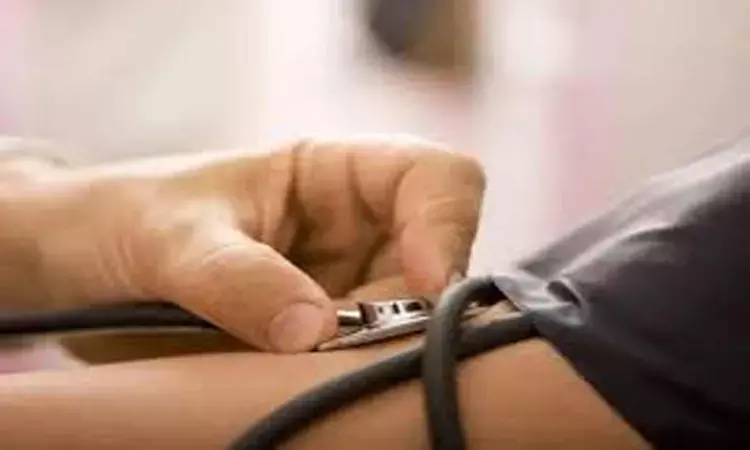- Home
- Medical news & Guidelines
- Anesthesiology
- Cardiology and CTVS
- Critical Care
- Dentistry
- Dermatology
- Diabetes and Endocrinology
- ENT
- Gastroenterology
- Medicine
- Nephrology
- Neurology
- Obstretics-Gynaecology
- Oncology
- Ophthalmology
- Orthopaedics
- Pediatrics-Neonatology
- Psychiatry
- Pulmonology
- Radiology
- Surgery
- Urology
- Laboratory Medicine
- Diet
- Nursing
- Paramedical
- Physiotherapy
- Health news
- Fact Check
- Bone Health Fact Check
- Brain Health Fact Check
- Cancer Related Fact Check
- Child Care Fact Check
- Dental and oral health fact check
- Diabetes and metabolic health fact check
- Diet and Nutrition Fact Check
- Eye and ENT Care Fact Check
- Fitness fact check
- Gut health fact check
- Heart health fact check
- Kidney health fact check
- Medical education fact check
- Men's health fact check
- Respiratory fact check
- Skin and hair care fact check
- Vaccine and Immunization fact check
- Women's health fact check
- AYUSH
- State News
- Andaman and Nicobar Islands
- Andhra Pradesh
- Arunachal Pradesh
- Assam
- Bihar
- Chandigarh
- Chattisgarh
- Dadra and Nagar Haveli
- Daman and Diu
- Delhi
- Goa
- Gujarat
- Haryana
- Himachal Pradesh
- Jammu & Kashmir
- Jharkhand
- Karnataka
- Kerala
- Ladakh
- Lakshadweep
- Madhya Pradesh
- Maharashtra
- Manipur
- Meghalaya
- Mizoram
- Nagaland
- Odisha
- Puducherry
- Punjab
- Rajasthan
- Sikkim
- Tamil Nadu
- Telangana
- Tripura
- Uttar Pradesh
- Uttrakhand
- West Bengal
- Medical Education
- Industry
Reduction of BP by restricting dietary sodium shows a dose-response effect

Evidence shows that sodium reduction lowers blood pressure in both hypertensive and non-hypertensive individuals, with greater effects in high-risk subsets. The magnitude of blood pressure-lowering achieved with sodium reduction showed a dose-response relation. In addition, very short term trials could substantially underestimate the effect of sodium reduction on blood pressure
High blood pressure is a leading modifiable risk factor for cardiovascular disease, which caused at least 17.8 million deaths worldwide in 2017. A higher intake of dietary sodium is associated with a higher level of blood pressure.
The effect of sodium reduction on blood pressure and the risk of cardiovascular disease has been examined in numerous studies. A few scientists have claimed that the benefit of sodium restriction for populations with normal blood pressure is small and could increase blood lipid levels and the risk of mortality while others suggest that a higher risk of mortality at low sodium intake levels is an artifact attributable to factors such as reverse causation and biased estimation of sodium intake.
The maximum daily intake of dietary sodium recommended by the World Health Organisation (WHO) is 2 g (5 g salt) for adults, and most countries recommend reducing intake to less than 2.4 g a day as part of a dietary approach to prevent high blood pressure and cardiovascular disease.
To examine the dose-response relation between reduction in dietary sodium and blood pressure change and to explore the impact of intervention duration, a group of scientists conducted a systematic review and meta-analysis following PRISMA guidelines. Their study was published in the article BMJ.
Researchers examined results from 133 randomized studies that included some 12,000 participants, including those with and without hypertension. All studies used 24-hour urine collections to confirm dietary sodium levels. The following are the key results of the study:
• The mean reductions (reduced-sodium v usual sodium) of 24-hour urinary sodium, systolic blood pressure (SBP), and diastolic blood pressure (DBP) were 130 mmol, 4.26 mm Hg, and 2.07 mm Hg respectively.
• Each 50 mmol reduction in 24-hour sodium excretion was associated with a 1.10 mm Hg reduction in SBP and a 0.33 mm Hg reduction in DBP.
The magnitude of blood pressure lowering achieved with sodium reduction showed a dose-response relation and was greater for older populations, non-white populations, and those with higher blood pressure.
For further reading click on the following link,
https://doi.org/10.1136/bmj.m315
MBBS
Dr K B AARTHI-has completed MBBS from SRM UNIVERSITY TAMIL NADU,Her interest is in the field of Pediatrics and Anaesthesia, also passionate in doing research and publishing articles.She joined Medical Dialogues in 2020 and publishes health news and medical updates. Email: editorial@medicaldialogues.in. Contact no. 011-43720751,9786713226
Dr Kamal Kant Kohli-MBBS, DTCD- a chest specialist with more than 30 years of practice and a flair for writing clinical articles, Dr Kamal Kant Kohli joined Medical Dialogues as a Chief Editor of Medical News. Besides writing articles, as an editor, he proofreads and verifies all the medical content published on Medical Dialogues including those coming from journals, studies,medical conferences,guidelines etc. Email: drkohli@medicaldialogues.in. Contact no. 011-43720751


